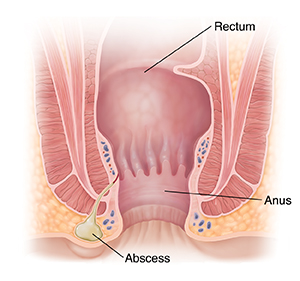A perianal abscess is an infection around your anus. The anus is the opening of your rectum. It's located between your buttocks. It’s where solid waste (feces or stool) leaves your body.
How to say it
payr-ee-AY-nuhl AB-sehs
What causes a perianal abscess?
Most perianal abscesses occur when an anal gland becomes blocked or due to a sexually transmitted infection. You have 8 to 10 of these glands around your anus. They can become blocked with bacteria or fecal matter. When blocked, they may become infected. They then fill with pus. Some people who have a perianal abscess also develop a fistula. This is a connection between the anal gland and the skin.
Other risk factors include:
-
Inflammatory bowel disease.
-
Colitis (inflammation of colon).
-
Pelvic inflammatory disease.
-
A weak immune system due to the use of certain drugs, smoking, HIV, or diabetes.
-
Constipation or diarrhea.
-
Anal sex.
Symptoms of a perianal abscess
A perianal abscess may appear as a red, swollen bump near the anus. The area may be sore to the touch. If it’s inside the anal canal, you may not see it. If a bump can't be seen or felt, your health care provider may order an imaging test to help with diagnosis.
The abscess can cause severe pain. You may feel sick and have a fever. If the abscess bursts, pus may ooze out of it.
Treatment for a perianal abscess
A perianal abscess should be treated right away. Treatments include:
-
Incision and drainage. Cutting open the abscess lets the pus inside it drain. This eases discomfort and pain. If a fistula develops, it may also need to be treated.
-
Sitz bath. Soaking the anal area by sitting in a warm bath several times a day after the abscess has been drained helps it heal. Another option is using hand-held showers to keep the area clean until it heals.
-
Medicine. In some cases, you may need antibiotics if an infection is severe. You may also need them if you have a health problem such as diabetes that may slow down healing. If your doctor prescribes antibiotics, take them as directed. Do not stop taking them just because you feel better. You need to take the full course of antibiotics.
When to call your health care provider
Call your provider right away if:
-
You have a fever of 100.4°F (38°C) or higher, or as directed by your provider.
-
You have redness, swelling, or fluid leaking from your incision that gets worse.
-
Your pain gets worse.
-
You have symptoms that don’t get better, or get worse.
-
New symptoms appear.
Author: Semko, Laura
© 2000-2025 The StayWell Company, LLC. All rights reserved. This information is not intended as a substitute for professional medical care. Always follow your healthcare professional's instructions.

